If you’re new to credit card rewards, Chase can be a great place to start, as it offers a terrific variety of valuable cards, often with excellent initial welcome offers. That said, the main reason to begin with Chase is because of its notorious 5/24 Rule, which can make it difficult to qualify for new cards once you’ve spent time growing your credit card portfolio.
Here you’ll find our recommendations for the Chase cards that we consider to be “must haves” for most points and miles enthusiasts, the idea being to give a sort “road map” when starting out with the bank. This post has been revised since its last publication with minor changes, updates, and corrections.
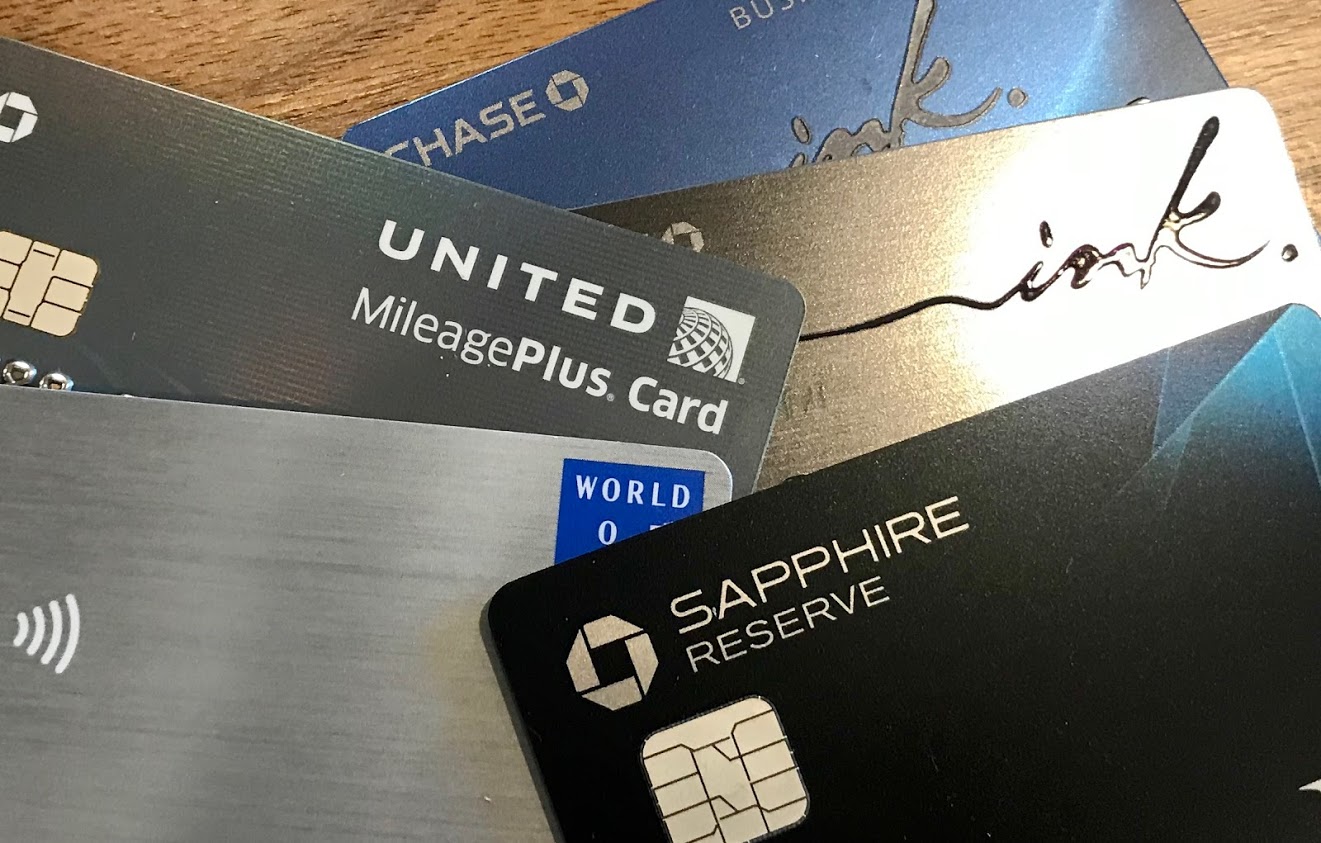
Chase Application Rules
- 5/24 Rule: You most likely will not get approved for a new card if you have opened 5 or more cards (with any bank) within the past 24 months. Most business cards do not count towards that five card total. Business cards that DO count include: TD Bank, Discover and the Capital One Spark Cash Select, Spark Miles and Spark Miles Select.
- 24 Month Rule: If you’ve previously had a card before, you can only get a welcome offer on that card again if you no longer have the card AND if it has been more than 24 months since you last received a welcome offer for that card. This rule does not apply to the Sapphire Preferred and Reserve cards (see below). There can be exceptions with some business cards.
- Sapphire cards: The Sapphire Preferred or Sapphire Reserve cards no longer have a family rule that prevents you from getting one if you currently have the other. However, both now have significant limitations that may prevent you from being eligible for a welcome offer if you've previously had the same card. In that event, you'll get a pop-up window that tells you that you're not eligible before you get a credit check and will ask whether or not you want to proceed with the application without the welcome offer attached.
- Southwest "Family" Rules: Chase applies additional "family" rules to the Southwest cards. You're not eligible for the welcome offer on a personal Southwest card if you currently have one, or if you've received a welcome offer on any personal Southwest card within the last 24 months. This doesn't apply to business cards. You also can't be approved for the Southwest consumer card if you already have one open.
- IHG "Family" Rules: You're not eligible for the welcome offer if you've received a welcome offer on any personal IHG card within the last 24 months. You also can't be approved for another IHG consumer card if you already have one open. You can have both an IHG personal and an IHG business card.
- 2 per month Rule: Most applicants are limited to 2 new cards per 30 days. Business cards are usually limited to one per 30 days.
- Marriott cards: Approval for any Marriott card is governed by a labyrinthine set of unintuitive rules. You can see the full eligibility chart here.
- Card Limits: Chase doesn't have a strict limit on the number of cards that you can have, but it does place limits on the total amount of credit that they will issue you across all cards. Because of this, reconsideration can sometimes be successful by moving credit from one existing card to the new card that you want.
- Application Status: Call (888) 338-2586 to check your application status.
- Reconsideration: If denied, call (888) 270-2127 for personal cards, or (800) 453-9719 for business cards, and ask for your application to be reconsidered.
What is the 5/24 rule?
Chase has quite a few compelling cards, but they also have what’s known as the “5/24 rule.” If you have opened 5 or more cards in the past 24 months, from any bank, Chase usually won’t approve you for any more cards.
In recent years, it’s become increasingly common to see data points from folks who have been approved for new co-branded (ie, United, Hyatt, etc) and Ultimate Rewards cards despite being over 5/24. However, that’s still the exception and not the rule.
We recommend getting all of the Chase cards that you want before going on to other cards.
Should you get business cards?
In order to sign up for a business credit card, you must have a business. That said, it’s extremely common for people to have businesses without realizing it, even if that business has yet to generate income.
For instance, if you sell items at a yard sale or on eBay, then you have a business. Similar examples might include: reselling concert/sports tickets, consulting, writing (e.g. blog authorship, planning your first novel, etc.), handyman services, owning rental property, renting on Airbnb, driving for Uber or Lyft, etc.
In all of these cases, your business is considered a sole proprietorship and you can apply for a business credit card using your own name as the business name, and your Social Security Number as your business Tax ID (also known as EIN).
Not only do business cards expand the potential choices you have for your own credit card portfolio, in most cases signing up for business cards won’t add to your 5/24 count. That’s true even for Chase’s own business cards. You usually have to be under 5/24 to get approved for a Chase business card (and you will probably see an inquiry on your credit report), but once you’re approved, the new card won’t increase your 5/24 count.
Chase Ultimate Rewards cards
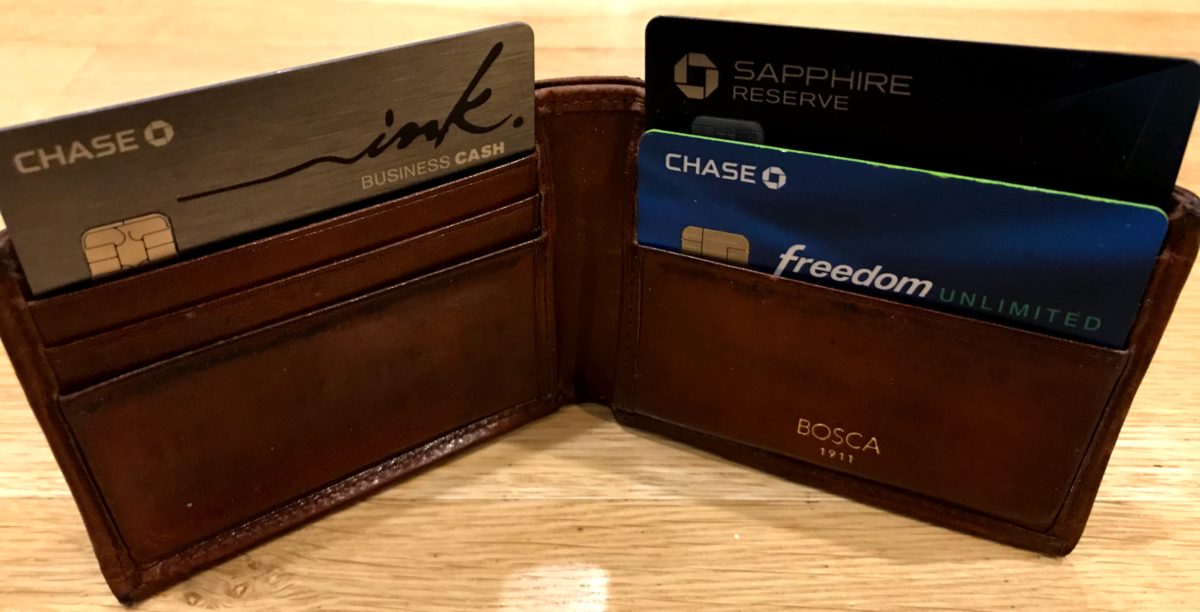
Chase offers cards from many co-brand partners like Marriott, Hyatt, United, Southwest, etc., but they also issue cards with their own rewards “currency” that’s called Ultimate Rewards.
Ultimate Rewards points can often be earned at a faster clip than the hotel points and airline miles you get from co-branded cards, and the points are more valuable because they’re much more flexible…they can be used to book travel directly or be transferred to airline and hotel partners (which is almost always the more valuable option).
This “transferability” is the real key to Ultimate Rewards’ value. If you see a great award flight deal on United, for example, you can transfer your points to United Airlines to book that award. Alternatively, if you find an opportunity to save big by using Hyatt points for a hotel redemption, you can transfer the points to Hyatt to book the stay.
If you’re just getting started, don’t worry if you don’t yet have any idea about how to do these things. It’s enough to know that getting the right cards now can set you up for great opportunities in the future.
Must have Ultimate Rewards cards
Not all Ultimate Rewards-earning cards allow transferring points to airline and hotel partners. In fact, only three currently available cards offer this option: the Sapphire Reserve, Sapphire Preferred, and Ink Business Preferred cards.
The fee-free Chase Freedom Flex, Freedom Unlimited, Ink Business Unlimited and Ink Business cash cards don’t allow you to transfer points directly to partners. However, each of them offers the ability to earn bonus points in specific spending categories and you can then combine those points with one of the three “premium” cards listed above, enabling you to transfer them to partners.
Confusingly, Chase advertises these fee-free cards as “cash back” cards, but they actually earn Ultimate Rewards points. On their own, the points earned on these cards are worth only 1 cent each, but when you move the points to a premium card they become more valuable either due to the ability to transfer to partners or to book travel through Chase.
Because of this, it makes sense to have at least one transfer-enabled card with decent bonus categories (like travel & dining) and one card that offers 1.5 points per dollar for all other spend. Most should also have a good 5x card that offers the ability to earn 5 points per dollar for some categories of spend. Below are the specific options that we’d recommend.
Sapphire Preferred
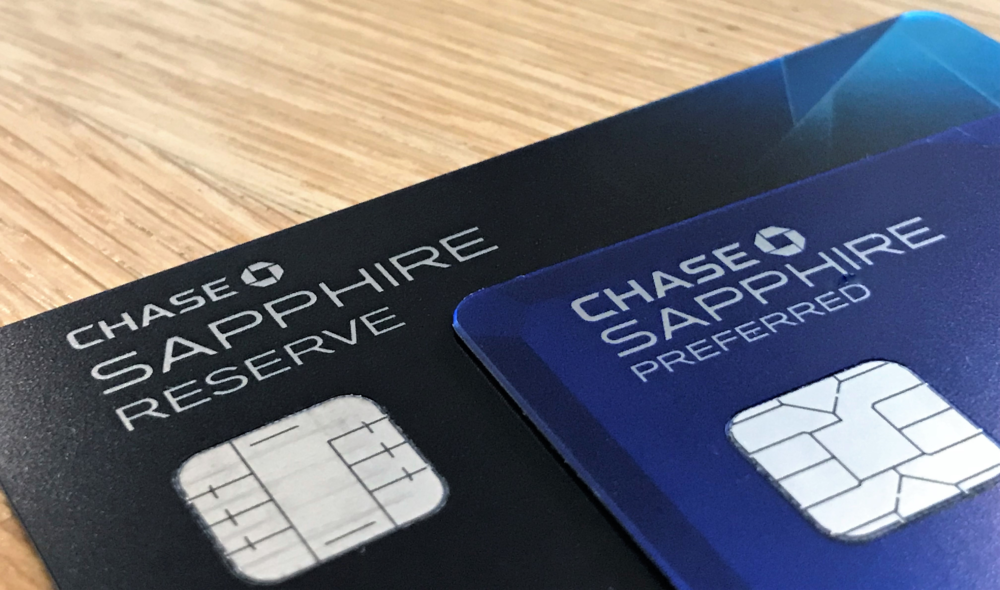
| Card Name w Details & Review (no offer) |
|---|
FM Mini Review: Great welcome offer. Unlocks ability to transfer points to hotel & airline partners. Solid option to pair with no annual fee Ultimate Rewards cards such as the Freedom cards, Ink Business Cash, and Ink Business Unlimited. $95 Annual Fee Earning rate: 5X Travel booked through Chase Travel℠ (2X all other travel) ✦ 5X Lyft through 9/30/27 ✦3X Dining ✦ 3X Select streaming services ✦ 3X Online grocery ✦ 10% annual point bonus Card Info: Visa Signature issued by Chase. This card has no foreign currency conversion fees. Noteworthy perks: Primary auto rental collision damage waiver ✦ Free DoorDash DashPass (min. one year, must activate by 12/31/27)✦ $10 off each month on one non-restaurant orders from DoorDash ✦ Transfer points to airline & hotel partners ✦ $50 back for hotel stays booked through Chase per cardmember year in the form of a statement credit ✦ Each account anniversary earn bonus points equal to 10% of total purchases made the previous year. |
For most folks, this would be my pick for the best starter Ultimate Rewards card that also offers the ability to transfer points to airline and hotel partners. Highlights include:
- 3X Ultimate Rewards points for dining, streaming services, and online grocery, 2x for all travel, 1x everywhere else
- 10% annual points bonus on base spend, effectively moving the earning power to 3.1x, 2.1x, and 1.1x depending upon the category)
- Primary rental car insurance
- $50 back each membership year for hotel stays booked through Chase.
- $95 annual fee.
When you have the card, you can use points to book travel through Chase Travel℠ at a rate of 1.25 cents each. Most importantly, it allows you to transfer all of your Ultimate Rewards points earned across all cards to airline and/or hotel partners.
Alternatives: Sapphire Reserve or Ink Business Preferred
- Ink Business Preferred: Earns 3X on travel, shipping, internet, cable, phone, and advertising with social media sites (up to $150K spend per year). This one isn’t a great choice for dining spend, but it does have the same 3X for travel that the Sapphire Reserve offers. Points are worth 1.25 cents each towards booking travel through Chase Travel and can also be transferred to airline and hotel partners. Primary rental car insurance is only for business travel.
- Sapphire Reserve: This one has a much higher annual fee ($550) but you’ll get back $300 each year automatically on travel spend. It earns 3X Ultimate Rewards for all travel & dining spend (1X for most other purchases. Points are worth 1.5 cents each when used to book travel through Chase Travel, or can be transferred to airline and hotel partners. The card also offers Priority Pass (with restaurant access) and best-in-class travel protections. Even if you want this card, you might still be better off getting the Sapphire Preferred initially (since the Preferred card usually has a better welcome offer) and then upgrading to the Sapphire Reserve after a year.
Freedom Unlimited
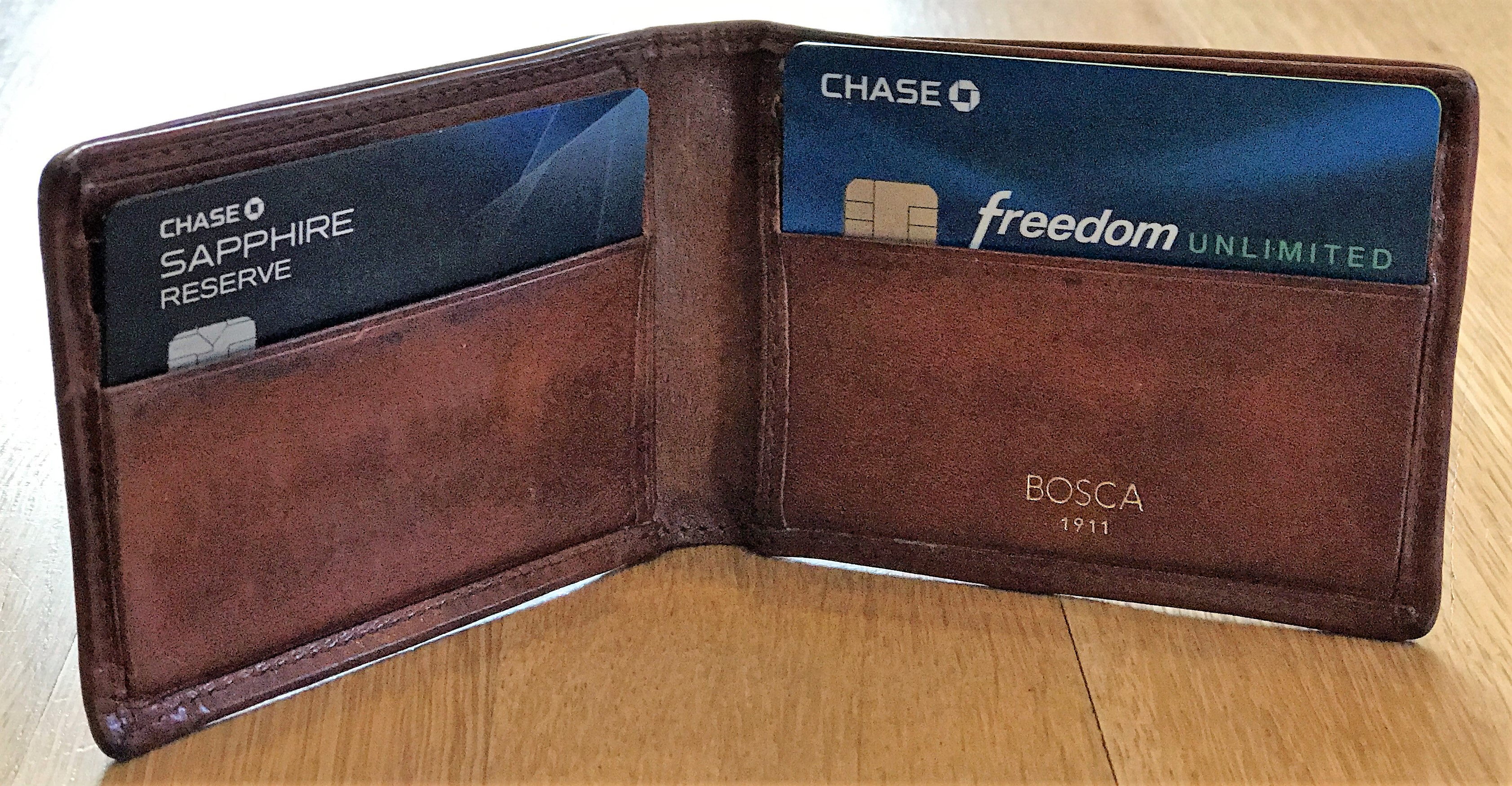
| Card Name w Details & Review (no offer) |
|---|
FM Mini Review: Great for 3x categories and 1.5X everywhere else. Excellent companion card to Sapphire Reserve, Sapphire Preferred, or Ink Business Preferred. Click here for our complete card review No Annual Fee Earning rate: 5x travel booked through Chase Travel℠ ✦ 3x dining ✦ 3x drugstores ✦ 2% cash back total on qualifying Lyft products and services purchased through the Lyft mobile application through 09/30/2027 ✦ 1.5X everywhere else Card Info: Visa Signature or Platinum issued by Chase. This card imposes foreign transaction fees. Noteworthy perks: Free DoorDash DashPass for 6 months upon activation ✦ $10 quarterly credit for non-restaurant DoorDash orders See also: Chase Ultimate Rewards Complete Guide |
This is a great card to pair with the Sapphire Preferred (or one of the other two premium options. It offers:
- 3X for all dining, 3X at drug stores, and 1.5X everywhere else
- No annual fee
- There is a foreign transaction fee, so don’t use it internationally.
Ideally, you’d use the Sapphire Preferred for its bonus categories only and then add in the Freedom Unlimited as an “everywhere else” card. Even though this card is advertised as a cash back card, it actually earns Chase Ultimate Rewards, which you can move to your Sapphire Preferred (or Sapphire Reserve/Ink Business Preferred) account in order to make the points transferable…and more valuable.
Alternative: Ink Business Unlimited
- Ink Business Unlimited: Like the Freedom Unlimited card, the Ink Business Unlimited offers a base earning rate of 1.5X everywhere, but the business version doesn’t offer 3X categories like dining and drug store purchases. Importantly, since it is a business card, it won’t add to your 5/24 count. If earning 3x at drug stores isn’t important to you, I recommend picking up the Business Unlimited card instead of the Freedom Unlimited (assuming that you have 3x on dining covered with the Sapphire Reserve or Preferred).
Ink Business Cash
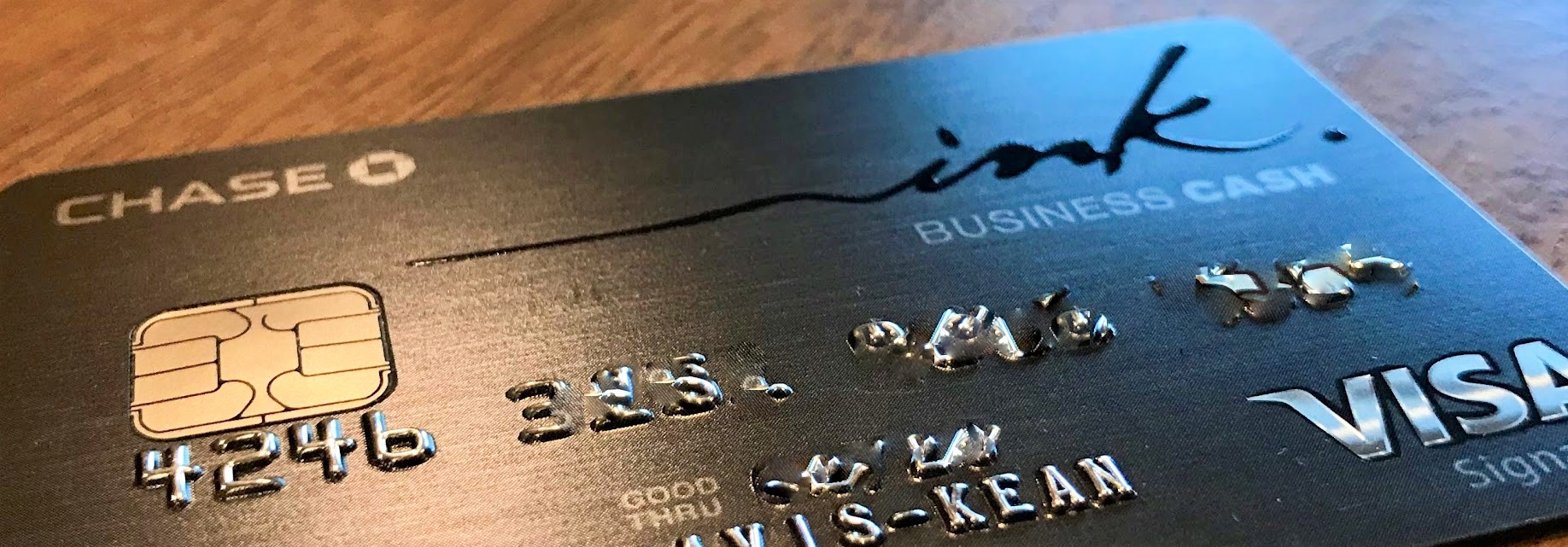
| Card Name w Details & Review (no offer) |
|---|
FM Mini Review: This one should be in everyone's wallet. Incredible welcome offer for a no-annual-fee card. Great card for 5X categories. Excellent companion card to Sapphire Reserve, Sapphire Preferred, or Ink Business Preferred. Click here for our complete card review No Annual Fee Earning rate: 5X office supplies and cellular/landline/cable (on up to $25,000 in total purchases in 5x categories annually) ✦ 2X on the first $25K in combined purchases at gas stations and restaurants each cardmember year ✦ 5x Lyft through September 2027 Card Info: Visa Signature Business issued by Chase. This card imposes foreign transaction fees. Noteworthy perks: ✦ Complimentary Instacart+ for 3 months (must activate by 12/31/27) ✦ $20 monthly Instacart credit See also: Chase Ultimate Rewards Complete Guide |
The Chase Ink Business Cash is one of our favorite cards. It includes:
- 5X earning at office supply stores and cellular/landline/cable (on up to $25,000 in total purchases in 5x categories per cardmember year), 2x on gas and at restaurants
- No annual fee
- Unusual perks for a card with no annual fee, including auto rental coverage, 1 year extended warranty, and 120 day purchase protection
- This card does charge foreign transaction fees, so it’s not a good choice for spend outside of the US.
Even though this card is advertised as a cash back card, it actually earns Chase Ultimate Rewards points which you can move to your Sapphire Preferred (or your Sapphire Reserve, or Ink Business Preferred) account in order to make the points more transferable.
Alternative: Chase Freedom Flex
- Freedom Flex: Another way to earn 5 Ultimate Rewards points per dollar is with the fee-free Freedom Flex card. This card offers 5 points per dollar on up to $1500 of spend each quarter, with the specific 5x categories changing four times per year. If you’re comfortable with business cards, you’ll most likely get more mileage from an Ink Cash. If not, this is a worthwhile second choice.
Must have Chase Hotel Cards
Chase offers hotel cards branded by Marriott, Hyatt, and IHG. Many of these hotel cards are worth considering because they come with an annual free night that can be worth more than the card’s annual fee. The ones that I consider must-have, though, are these:
Ritz-Carlton
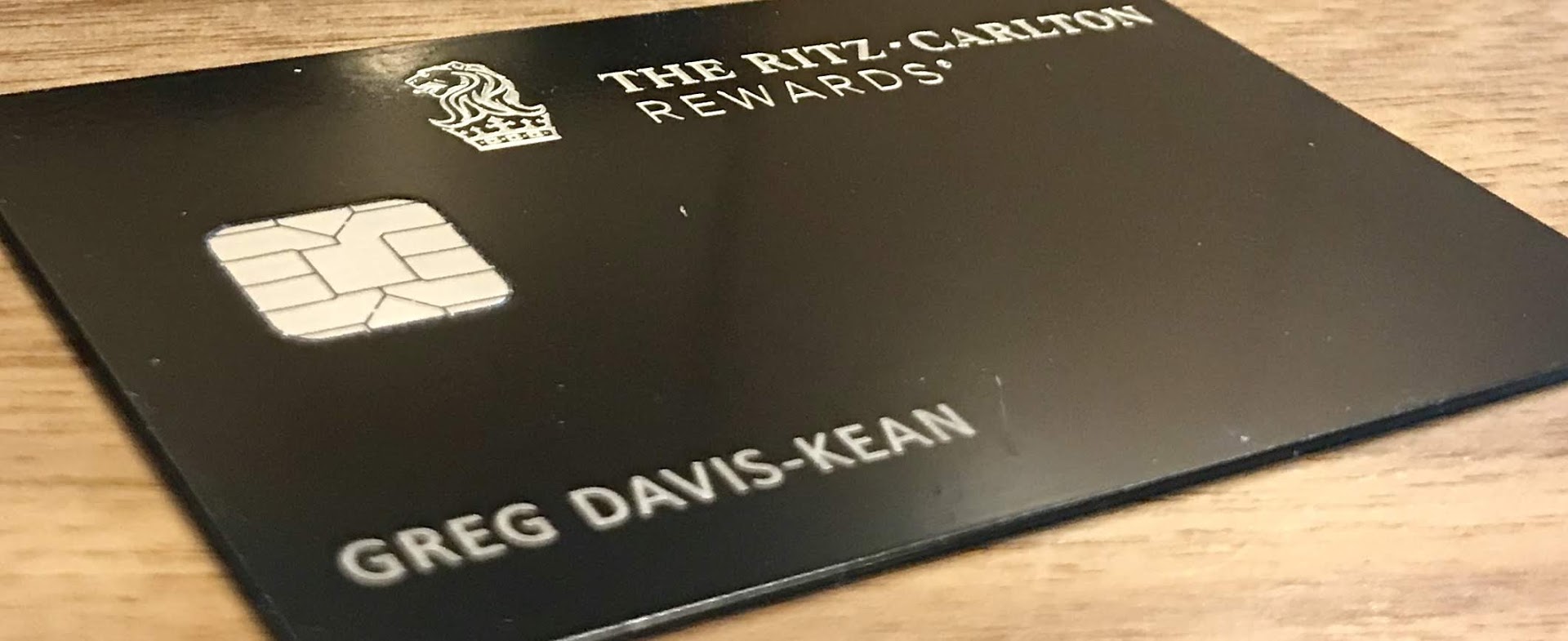
| Card Name w Details & Review (no offer) |
|---|
FM Mini Review: While the card is pricey, the annual free night, plus $300 in airline fee credits, plus other perks make this card a keeper. $450 Annual Fee Earning rate: ✦ 6X Ritz & Marriott.✦ 3X airline tickets purchased directly with the airline, at car rental agencies and at restaurants ✦ 2X everywhere else Card Info: Visa Infinite issued by Chase. This card has no foreign currency conversion fees. Big spend bonus: $75K spend per calendar year for Platinum elite status Noteworthy perks: ✦ Annual 85K hotel certificate upon renewal ✦ 3 club level upgrades. $100 hotel credit for each 2 night or longer stay ✦ Priority Pass Select with unlimited guests ✦ Access Sapphire Lounges for yourself and unlimited guests for free ✦ $300 annual credit for airline incidentals ✦ Automatic Gold Status See also: Marriott Bonvoy Complete Guide |
The $450 Ritz card is arguably the best of all of Chase’s co-branded cards. The annual fee is hefty, but look what you get:
- An annual free night certificate worth up to 85,000 points
- $300 in annual travel incidental credits
- Priority Pass including restaurants with unlimited guests
- Free authorized users (each of which can get their own Priority Pass)
- The same best-in-class travel and purchase protections as the Chase Sapphire Reserve.
Simply put, this an outstanding card. However, there a catch: it’s not available by applying directly. The only way to get it is to start with a regular Chase Marriott consumer card and then upgrade it to the Ritz card after a year. The Bonvoy Boundless Card is my favorite stepping stone in that process. Its good enough on its own that, if you change your mind about upgrading or if Chase stops allowing upgrades in the future, you’ll still have a decent card.
IHG Premier or Premier Business
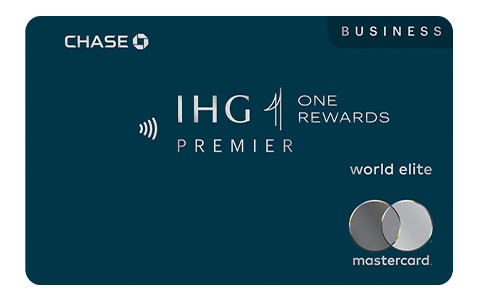
| Card Name w Details & Review (no offer) |
|---|
$99 Annual Fee Earning rate: 10X IHG ✦ 5X travel, gas stations, restaurants and dining, social media and search engine advertising, office supply stores ✦ 3X on all other purchases Base: 3X (1.83%) Travel: 5X (3.05%) Dine: 5X (3.05%) Gas: 5X (3.05%) Office: 5X (3.05%) Brand: 10X (6.1%) Card Info: Mastercard World Elite issued by Chase. This card has no foreign currency conversion fees. Big spend bonus: 10K bonus points + $100 statement credit after you spend $20K in a cardmember year + make one additional purchase. ✦ Diamond status after $40K in purchases + one additional purchase in a calendar year ✦ Free night certificate (up to 40K points) after $60K in purchases + one additional purchase in a calendar year Noteworthy perks: Anniversary free night e-certificate good at IHG properties up to 40K points per night ✦ Ability to add an unlimited number of points to a free night certificate to book a higher-level hotel ✦ Fourth night free on award stays ✦ 20% discount on points purchases ✦ Platinum elite status ✦ Up to $50 in United TravelBank cash per year (must register your card with your United account) ✦ Complimentary Instacart+ for 3 months (must activate by 12/31/27) ✦ $10 monthly Instacart credit |
The IHG Premier and IHG Premier Business are nearly identical; both cards offer:
- An annual 40K free night e-certificate (with the ability to top-off with points for higher-priced stays)
- Fourth night free on award stays
- Platinum elite status (or Diamond status with $40K annual spend)
- Up to $50 in United TravelBank cash per year
If you’re ok applying for business cards, you might as well go for the business version in order to avoid adding to your 5/24 count. Otherwise, get the personal card.
World of Hyatt
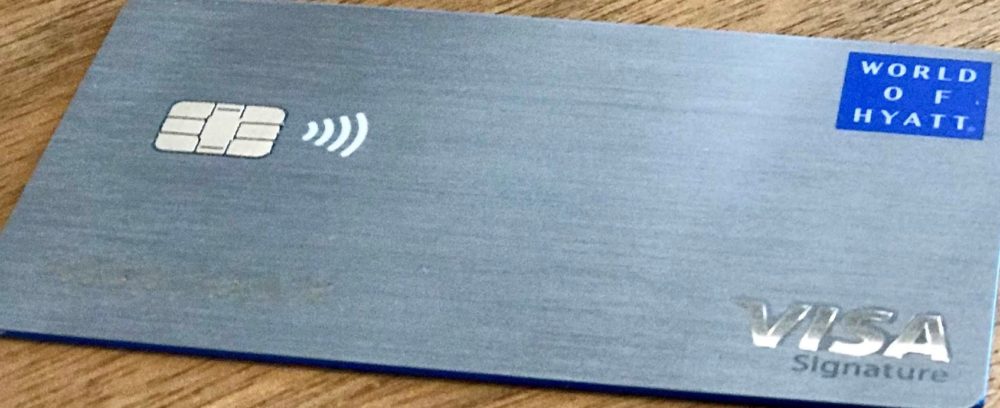
| Card Name w Details & Review (no offer) |
|---|
FM Mini Review: Great card for welcome offer and annual free night. Might be worth using regularly for additional free night and as a path to status. $95 Annual Fee Earning rate: ✦ 2X restaurants / cafes / coffee shops, airlines, local transit, fitness clubs and gym memberships ✦ 4X Hyatt and Mr & Mrs Smith Card Info: Visa Signature issued by Chase. This card has no foreign currency conversion fees. Big spend bonus: One free Cat 1-4 night certificate after $15K spend in a calendar year. ✦ Get 2 elite qualifying night credits every time you spend $5K in purchases Noteworthy perks: ✦ Free category 1-4 night every year upon renewal ✦ Additional free category 1-4 night after $15K spend in calendar year ✦ Discoverist elite status ✦ 5 elite qualifying nights ✦ Complimentary Instacart+ for 3 months (must activate by 12/31/27) ✦ $10 monthly Instacart credit |
For $95 per year, the World of Hyatt card gets you an annual category 1-4 free night certificate, with the option to add another certificate after $15K in annual spend. Those certificates can often be used at hotels that would have cost $250 or more per night, and Hyatt doesn’t impose resort or destination fees on award stays. This card is also good for those who would like to earn high level Hyatt elite status through spend, as you get two elite night credits for every $5K that you put on the card.
Chase Airline Cards
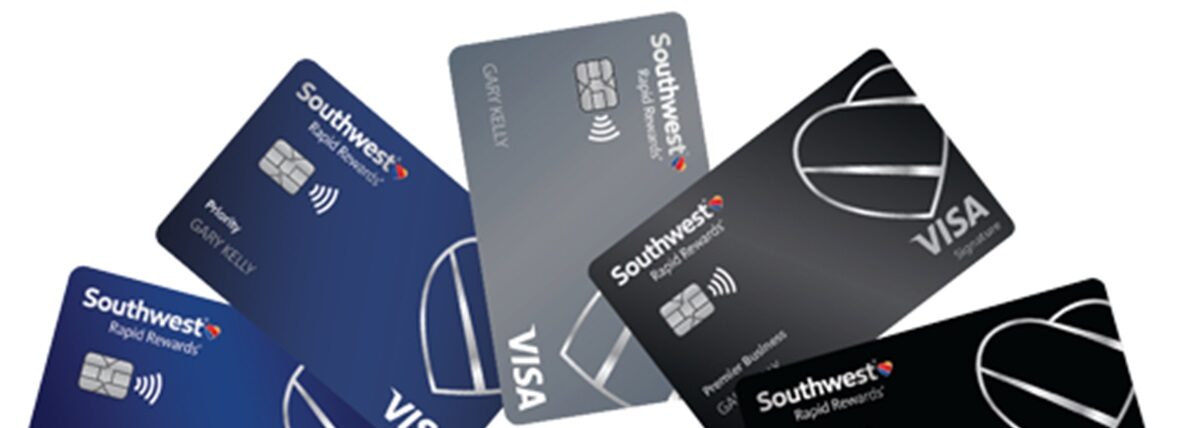
Chase offers a large selection of co-branded airline cards that includes various options for: United, Southwest, Air Canada Aeroplan, British Airways, and more. Any of these cards can make sense to have if you fly the specific airline often, but it’s hard to call any one of them a “must have.” In addition, the modest earning rates probably make them unappealing for most folks for regular spend. We’ll discuss a few of the options below.
- Southwest Rapid Rewards Priority Credit Card: If you fly Southwest at least a few times per year, this card can make a lot of sense. For $149 per year, you get 7,500 anniversary points, $75 in Southwest annual travel credit; Four A1-15 boardings every year, 10,000 annual companion pass qualifying points and 20% back on in-flight drinks, Wi-Fi, messaging, and movies.
- The Aeroplan Card: There’s a lot to like here, including great category bonuses for an airline card (3x grocery, dining, and Air Canada spend), the ability to earn & boost elite status with spend, discounted award pricing and a free checked bag. Aeroplan is a very rewarding program to get involved in as it has a massive amount of award partners with some very appealing redemption options.
- United Gateway Card: Like all United branded cards, the Gateway card unlocks improved economy saver award availability (when downgraded from a card with an annual fee). However, unlike other United cards, this one doesn’t have an annual fee. Sign up for whatever consumer United card offers the best welcome bonus (see our Best Offers page) and then downgrade to the Gateway card when the second year annual fee comes due. Even if you rarely fly United, this can be a good card to keep in the sock drawer for times when you want to book award flights.
- United Business Card: For semi-regular United flyers, this $99 card offers a lot of potential value: free first checked bag, priority boarding, 2 United Club passes per year at anniversary, primary auto rental collision damage waiver and 5,000 bonus miles each anniversary when you have both this card and a personal Chase United credit card (including the no-fee Gateway card listed above).
What about the Southwest Companion Pass?

A post about “must have” Chase cards isn’t complete without considering Southwest. Southwest offers one of the best deals in travel: earn 135,000 qualifying points within a calendar year and then a companion can fly free with you for an unlimited number of flights (paid flights and/or award flights) for the rest of that calendar year and all of the next year. Significantly, points earned from Chase Southwest credit cards do qualify towards a companion pass.
The easiest way to earn a Southwest Companion Pass is to wait until near the end of a calendar year and then apply for both a personal and business Southwest card (or two business cards). Make sure not to complete the minimum spend requirements until January 1st so that points will be awarded early in the new year. With two welcome offers, you’ll likely earn enough points for a companion pass that will be good for the rest of that year and all of the next.
This is obviously an incredible deal, but it requires staying at 4/24 or below in order to sign up for the Southwest cards. (If you are at 4/24, you can get approved for a Southwest business card first and then go for either the other business card or a consumer card).
If you sign up for all of the “must have” cards that are listed below, and no other consumer cards, you’ll end up at 3/24 or 4/24 (assuming you include a least some business cards). So, even after obtaining all of these cards within a 24 month period, it would still be possible to do the Southwest two card strategy and get your mits on a companion pass.
“Must have” Chase Card Summary
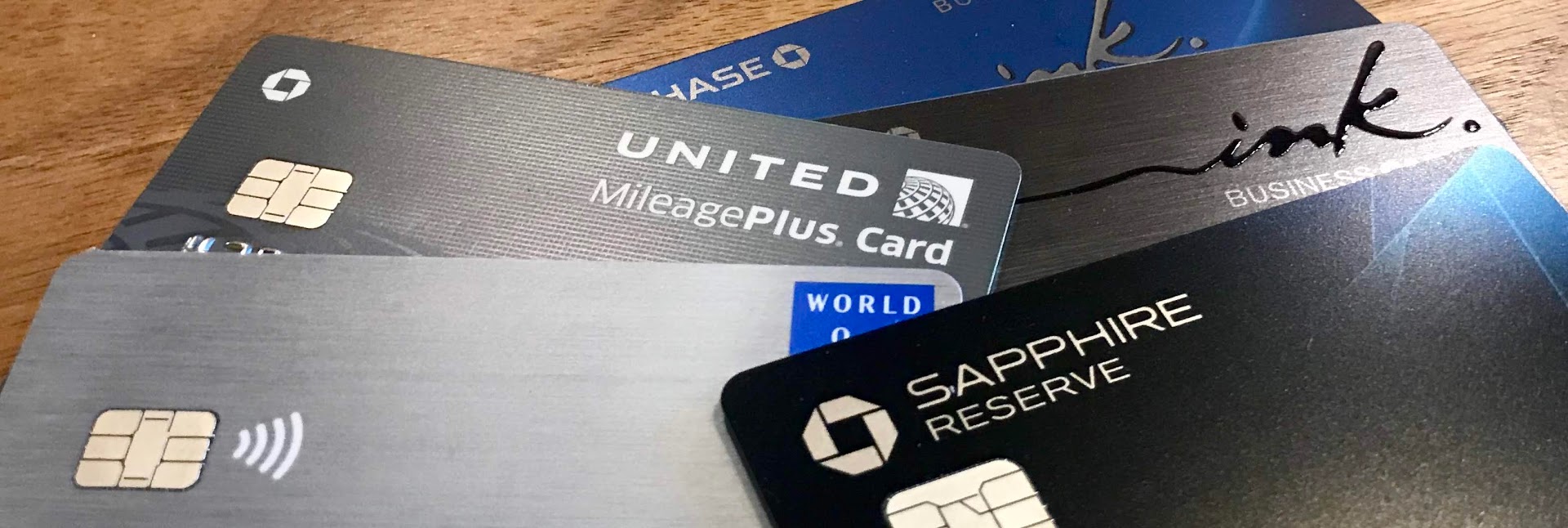
If you are comfortable applying for business cards, I’d recommend the following line-up of Chase cards:
- Sapphire Preferred: Earn 3X Ultimate Rewards points for dining, streaming services, and online grocery, 2x for all travel and 1x everywhere else. Points are transferable to airline and hotel partners or worth 1.25 cents each towards travel booked through Chase.
- Ink Business Cash: Earn 5X Ultimate Rewards points at office supply stores and 5X on cellular/landline/cable charges (on up to $25,000 in total purchases in 5x categories annually) and 2X gas and restaurants. If you’re not interested or able to sign up for a business card, then consider the Freedom Flex instead.
- Freedom Unlimited or Ink Business Unlimited: Earn 1.5X Ultimate Rewards points for all other spend.
- Ritz-Carlton: Start with the Bonvoy Boundless Card and upgrade to the Ritz after the first year. You’ll get an annual free night certificate worth up to 85,000 points, $300 in annual travel incidental credits, Priority Pass with unlimited guests and restaurant access, free authorized users (each of which can get their own Priority Pass) and the same best-in-class travel protections that come with the more expensive Sapphire Reserve. This is the cream of the co-branded crop.
~~~If you’re not applying for business cards, you’re now at 4/24. Pause here if you want to pursue a Southwest companion pass~~~
5. IHG Premier Business: Keep for the annual 40K free night e-certificate (with the ability to top-off with points for higher-level stays), fourth night free award stays; Platinum elite status (or Diamond status with $40K annual spend) and up to $50 in United TravelBank cash per year. If you’re not interested or able to sign up for a business card, then sign up for the IHG Premier instead.
6. World of Hyatt: Keep for the annual free night certificate. Consider spending $15K per year for a second certificate, especially if you pursue Hyatt status since you’ll earn 2 elite qualifying nights with each $5K spend.


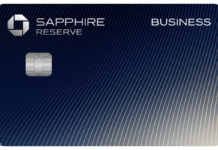


[…] This is a good post and I am in agreement: What are the “must have” Chase cards?. […]
Thank you for all the great content you provide. Both my husband and I opened 3 Chase biz cards in December. All 3 resulted in hard credit checks. We have a total of 6 Chase biz cards between us. The previous 3 had not resulted in hard credit checks. This was not good news for us!!
Love this list, but I think the term “must have” has been watered down, to the point that you really mean “better to have than not have, and then only if you make full use of the perks”. Holding 6-9 Chase cards (depending on how many airline cards you “must” have) is a lot, ask anyone not in this hobby. Heck, I can’t sell P2 on that many cards — and she’s the main beneficiary!
IMHO, the only “must have” Chase card is a Sapphire Reserve or Preferred, or an Ink Preferred, which is the entree to the points and miles universe. Everything else depends on your individual situation. (If I don’t stay at Hyatts, why would I want a Hyatt card?)
For cell phone plan payments, would you use the ink cash or the business platinum? Or a mix of both, for credit back, plus insurance plus 5%
you cant the full payment need to be made on the plat card, i called and asked before about it
Different company but does anyone have a suggestion as to how to get started with Amex cards? My wife has none although she is pre-approved for a green card but with only 40,000 bonus points. I tried the platinum but she wasn’t approved for that and was rejected.
Start with green, wait a while and see what other offers she gets later?
Correct as to your last question.
I think it is worth mentioning the United Business benefit of spend 7x $100 on United and get $100 back. This can be easily achieved with 7x TravelBank purchases, so for anyone who averages >$700/year on United, the benefits should outweigh the cost of the AF (5K miles/year, Club passes). I pay for my own work travel, so it is easy to keep my TravelBank in check and thus this card has a long-term spot in my sock drawer as a keeper.
How are you getting the $100 back? TIA
One of the listed benefits for this card on the Chase website is this: “Enjoy a $100 United travel credit after 7 United flight purchases of $100 or more within each account anniversary year”. It just comes as a statement credit.
In 2023, I paid my AF renewal on Sep 07, bought 7x $100 on United TravelBank on Oct 22, and received a credit of $100 on my statement on Oct 22. Thus my next statement total was only $600, and I earned 1400 miles on that statement (2x earning on United for the $700).
Are flights themselves also included as eligible transactions? I might be able to make use of this when booking multiple flights for others, but the terms are kind of vague.
“United flight travel-related purchases include seat upgrades; Economy Plus®; inflight food, beverages and Wi-Fi; baggage service charges or other United fees.”
It doesn’t specifically include flights, but it doesn’t exclude them either, and it says “travel-related” so I don’t know if actual travel is excluded.
Important tip on the Ritz Carlton card. I always had a hard time with this card because I could never exploit value in the $100-credit rate and Club Level upgrade certificates. BUT, these benefits are usable by authorized users. For stays where there’s no AAA rate (say, outside the US), these rates might make sense. For me, it’s now a keeper.
If a person uses ***non-network*** hotels, the 10X offered by the Sapphire Reserve is attractive. The extra points from one stay alone can offset the higher annual fee. There are arguments against using portals. But, in the case of non-network hotels, the 10X might outweigh those arguments for some. Just remember to always book fully refundable stays.
Hi, was looking back at this as a reference, it seems like the page is loading with a bug, as it basically shows the info on basically every card available, making the article extremely long. The text is in there somewhere, but this is very difficult to read.
Greg,
First, this is just an awesome post, I really like your strong opinions vs the “this might be best for you” kind of reasoning! Second, I currently have had the original Chase Freedom and Chase Freedom Unlimited for long enough that I am currently starting from ‘scratch’ on the 05/24. I just signed up for the Marriott Bonvoy Boundless card as I am using that for some hotels this calendar year–I will also look into upgrading to the Ritz card if that makes sense.
So, I have 4 slots left. If I am only going to fly once or twice this year and generally infrequently, what’s best to fill the remaining slots before “Venturing(pun intended)” outside of chase? Obviously one the Sapphire cards, although i’m frustrated that i missed the 80k sign up bonus for Preferred, so i’m leaning towards the ink biz preferred to be the travel card for now and saving a slot on Reserve or Preferred Sapphire when a big sign up opportunity comes.
That would leave me w/4 slots, or 3 slots if I want to stay at 4/24 and sign up for the business cards periodically when I have the spend ability to get the points w/the the signup period.
Do I go w/the United Biz Card or Southwest and then another Hotel card(s)? I would like to get other cards so i might as well go to 4 slots, finish the biz cards than the final 5th slot to max out Chase for now. Then i can start to work on the other brands incl Amex/Cap One, etc.
(of note, I would fly out of Dulles which is a big United hub, vs SW which flies out of BWI which would def be secondary)
Establish a multi-year cycle with United cards. Do one United consumer card per year and one United business card per year for the sign-up bonuses then cancel after a year.
To deal with the 24-month SUB limitation, alternating, get a Marriott card in odd years and a Hyatt card in even years. Secure SUB then cancel after a year.
What combo would you recommend for long term international travel?
With Chase: Sapphire Preferred will give you 3x dining. If you value also getting 3x travel go with the Sapphire Reserve.
Beyond Chase, consider Citi Premier for lots of good 3x categories and Venture or Venture X for 2 everywhere else rewards.
P2 signed up for the Chase Ink Business Unlimited in February 2021. I heard that she can sign up for another Chase Ink Business Unlimited and get the sign up bonus since it’s been over 24 months and not have to product change her existing card. How does that work? Thanks.
There’s no special trick to it. She can just sign up for another card.
Thanks, Greg!
I just applied for the Ink Business Cash, and was instantly approved. That was a surprise. Thank you guys for all of the great info you constantly provide!
Is it possible to get both the personal and business IHG card? You could get 2 free night certs worth 40k each each year and 280k IHG points sign up bonus. Also $50 United Travel Bank credit every 6 months. I’d assume most people are trying to spend at least 2 nights in one place before hopping to the next place?
Yes you can get both. My understanding is that the United credit doesn’t stack though. You’ll still only get $25 per 6 months
I’ve seen this recommendation on r/churning and several blogs, but I was at 4/24, took your advice to get the all time high 150k MR by getting a Platinum card and since then have missed at least two opportunities for what I would call much better than average SUBs. I’m not blaming anyone but myself for this. My advice to my younger self would be to alternate personal and business and not get above 3/24, unless there is a great opportunity. And if you have a willing P2 participant, get that person in the rotation as soon as possible, not when you are at 5/24.
On a completely unrelated topic; Does anyone take into account airline ratings when applying for cards? I’ve seen United near the bottom of several airline ranking lists, only above Spirit and Allegiant. I’m just mentioning it because you seem to tout the United cards. Of course if you simply book other airlines within Star Alliance with United miles then I guess it doesn’t matter? Or is United really not that bad? I haven’t flown them in forever even though I live near one of their hubs.
When signing up for cards for the bonus, I only care about how I’ll use the points, not whether I like that particular airline or not. In this case, the point isn’t to snag the best bonuses, but rather to get unique cards that you won’t be able to get again once you’re over 5/24 (bonuses are gravy). The fee-free United card is unique because it has no fee and yet makes your United miles more useful thanks to offering improved saver award space.
As to the question of how bad United is: I don’t fly them often because they don’t have many flights out of Detroit, but when I have I’ve had fine experiences.
I’ve always been a little confused about the following statement:
“If you have opened 5 or more cards in the past 24 months, from any bank, Chase won’t approve you for any more cards.”
Middle of next October I need to get two Southwest cards for the Companion Pass. At that time I will have signed up for three business cards and one personal card in the past 24 months so I will be 1/24. After I get the first Southwest card I will have opened five cards in the past 24 months. So will I still be good for that second Southwest card?
Thanks!
I think it’s 5 or more personal cards, not 5 or more cards.
Thanks!
Yes, you’ll be good. That statement was meant to be a simplification, but it should really say “If you have opened 5 or more cards which were added to your credit report in the past 24 months, from any bank, Chase won’t approve you for any more cards.” Most business cards aren’t added to your credit report.
Thanks! By the way, great article and great web page!
Thanks!